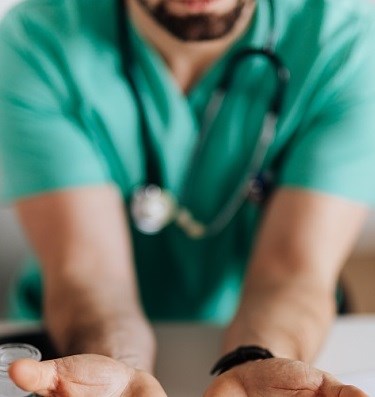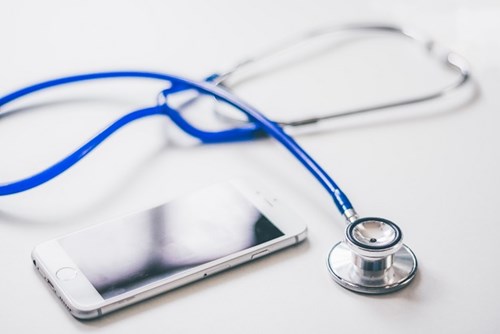DEPRESSION: A DOCTOR’S ROLE
From The Blurt Team
Depression can come out of nowhere and knock you to your knees.
It can also develop gradually over time. So slowly, that those around you may notice something is up before you do. It can affect every aspect of our lives. Those who have never experienced depression often underestimate how debilitating depression is.
As if depression isn’t enough to deal with, the stigma of mental ill-health means that we quite often feel ashamed, guilty and frightened too. The stigma prevents so many people from reaching out for the help and support they so desperately need and deserve.
Depression is much more common than you might think. Those with depression tend to not talk about it which is one of the reasons we all feel so alone.
According to the World Health Organisation, globally, an estimated 350 million people of all ages suffer from depression. The Mental Health Foundation states that between 8% and 12% of the population experience depression in any year.
WHEN SHOULD I MAKE AN APPOINTMENT TO SEE MY DOCTOR?

A strong support system is an important part of recovery. Your doctor will play a key role in that support system.
Depression is a complex illness and the symptoms can vary from person to person.
Below is a list of depression symptoms, which the NHS has put together. If you’ve been experiencing some of these symptoms for two weeks or more, please speak to your doctor.
– continuous low mood or sadness
– feeling hopeless and helpless
– having low self-esteem
– feeling tearful
– feeling guilt-ridden
– feeling irritable and intolerant of others
– having no motivation or interest in things
– finding it difficult to make decisions
– not getting any enjoyment out of life
– feeling anxious or worried
– having suicidal thoughts or thoughts of harming yourself
– moving or speaking more slowly than usual
– change in appetite or weight (usually decreased, but sometimes increased)
– constipation
– unexplained aches and pains
– lack of energy or lack of interest in sex (loss of libido)
– changes to your menstrual cycle
– disturbed sleep (for example, finding it hard to fall asleep at night or waking up very early in the morning)
– not doing well at work
– taking part in fewer social activities and avoiding contact with friends
– neglecting your hobbies and interests
– having difficulties in your home and family life
WHAT DO I SAY TO MY DOCTOR?

The stigma of mental ill-health means that we sometimes struggle to put what we’re going through into words. We might downplay some of the symptoms and feel embarrassed. You might also feel like a burden, as though you don’t deserve help and support.
Depression alters our perceptions on the world and of ourselves. You are not a burden at all. Honestly, you’re not. You are as worthy of help as anyone is.
If you’re struggling to use the telephone, which is a common anxiety for those with depression, then ask someone else to make the call for you. Your surgery might also accept email/online booking of appointments too.
Another symptom of depression is that it can affect our memory and so you might find it useful to make a list of the symptoms you’ve been experiencing, including the impact they’re having on your daily life. Be completely honest and write down anything which pops to mind, you might think it’s trivial but it all helps.
You can hand this list to your doctor if you’re struggling to speak out loud about what you’ve been going through.
There’s also a Depression PHQ Questionnaire which you can complete and take to your appointment.
This helps provide the doctor with vital information in terms of diagnosis, types of medication they may offer and also other services they may be able to refer you to.
In some cases, your doctor might want to carry out tests to rule out other illnesses such as an under or active thyroid which have similar symptoms to depression.
WHAT WILL MY DOCTOR SAY?

Your doctor will talk through your symptoms with you and ask you some questions about your lifestyle too. They might suggest lifestyle changes, local support groups, medication, counselling, Cognitive Behavioural Therapy (CBT), psychotherapy and/or you to a local Mental Health team.
I’VE BEEN PRESCRIBED MEDICATION BUT IT’S MAKING ME FEEL WORSE.
Medication can take a little while to work and settle into your system. It’s always best to communicate your concerns with your doctor. It might be useful to make a list of the side effects you’re experiencing so that you don’t leave anything out.
It’s natural to want to immediately stop taking any medication which is making you feel worse. Please don’t do this. It can actually be quite dangerous and lead to some pretty nasty withdrawal effects. Where medication is concerned, it is always best to seek advice from your doctor.
I’M NOT HAPPY WITH MY DOCTOR.
Sometimes, we’re not happy with how we’ve been treated. Please don’t give up. You can request to see another doctor at your surgery. You don’t have to explain why you want to see a different doctor either.
HELP! I DON’T KNOW HOW TO CONTACT MY DOCTOR.
The NHS have put together this search facility. You can search by your town or postcode. The search results will give you the telephone number, address, directions and let you know whether online booking is available.
If you need to speak to a doctor out of hours, please call the NHS on 111. For help in an emergency, ring 999.

